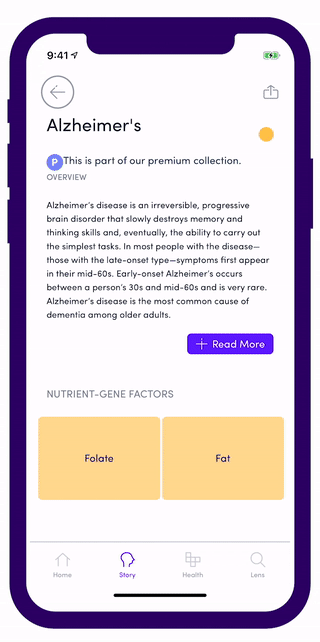"We have to watch Nana's life slipping away from her like a forgotten word. I thought I understood what's happening to her, but this isn't like being robbed a penny at a time. Memories aren't currency to spend; they're us. Age isn't stealing from my grandmother; it's slowly unwinding her.”
― Shaun David Hutchinson, We Are the Ants
An irreversible disease that destroys brain cells
Alzheimer's is the most common cause of dementia - an umbrella term for memory loss and a decline in cognitive abilities. Alzheimer's disease (AD) is thought to be responsible for 60 to 80 percent of dementia cases and is the sixth leading cause of death in the United States. The disease starts decades before the symptoms actually appear.
In most cases, Alzheimer's is an age-related disease and mostly affects individuals above 65 years of age. A comparatively rare form of Alzheimer's, termed as early-onset or younger-onset Alzheimer's, effects middle aged individuals between 40-50 years of age. In its early stages, memory loss is mild, but with late-stage Alzheimer's, individuals lose the ability to carry on a conversation and respond to their environment. According to estimates 30 million people suffer from AD.
What causes Alzheimer’s?
While early onset Alzheimer’s is known to be rare and associated with specific genes, late onset Alzheimer’s is much more prevalent and is thought to be multifactorial - a combination of genetic, environmental and lifestyle factors. Potential environmental causes like radiation and exposure to chemicals have been floated. There are also research studies indicating a link between AD and gum bacteria as well as herpes virus. However, none of the research is conclusive yet and scientists are still at a loss as to what really causes Alzheimer’s.
Link between diet and AD
The genetic predisposition to Alzheimer’s can be potentially suppressed by adapting to a healthy lifestyle that includes a balanced diet and exercise. The link between our diet and AD lies in the biochemistry behind Alzheimer’s. Plaques and tangles are the prime suspects for causing AD. Plaques are deposits of a protein fragment called beta-amyloid and tangles are twisted fibers of another protein called tau.
The formation of insoluble deposits of these plaques is influenced by the type of food we eat. Various researches suggest that there is a dietary risk associated with AD, and includes inadequate intake of various dietary components including fats, antioxidant nutrients and B-Vitamins. Research also shows the protective role of omega-3 fatty acids, such as docosahexaenoic acid (DHA) , in AD and cognitive decline.
Role of folate & MTHFR mutation
Folate is an essential cofactor that plays an important role in the metabolism of amino acid, purine and the methylation of DNA. The folate cycle involves various important vitamins and nutrients, such as vitamin B12, vitamin B6, and vitamin B2 and folate as cofactors. The MTHFR mutation affects the absorption of folate and individuals with a lower MTHFR efficiency might be at an increased risk of AD.
Where Cholesterol fits in
When it comes to dietary aspects of AD, cholesterol is considered to be an important factor and it is linked to various other neurodegenerative disorders. Brain is considered to be the richest organ in cholesterol. Cholesterol plays an important role in the development and functioning of central nervous system and neurons, and it regulates the release of neurotransmitters.
APOE gene and cholesterol
The APOE gene encodes a protein called apolipoprotein and this protein combines with fats or lipids in the body to form lipoproteins. The lipoproteins are involved in the packaging of cholesterol molecules and other fats, and carry them through the bloodstream. APoE is a transporter protein, primarily involved in the movement of extracellular lipids and cholesterol in the brain. There are 3 different forms of the APOE gene: e2, e3, and e4. The APoE e3 is the most prevalent form in the general population. While individuals with APOE lipoprotein ε4 (APOE-ε4) genotype are considered to be at risk of developing AD.
What impacts cholesterol levels?
The amount of unsaturated and saturated fat in your diet can influence your levels of total cholesterol (HDL and LDL).
Fats are present in four forms: saturated, monounsaturated, polyunsaturated, and trans fats.
Consumption of trans fats is linked to an increase in blood cholesterol level and we know now that high cholesterol can lead to increased risk of AD. Consumption of Omega3 fatty acids, obtained from sources like salmon, hold remarkable potential for prevention of Alzheimer's disease. So, a diet rich in unsaturated, un-hydrogenated fats is highly recommended especially if you have certain variants of APOE. Whereas the increased intake of saturated or trans-unsaturated (hydrogenated) fats drastically increase the risk of AD.
Take action on your folate and saturated fat risk
A better understanding of your folate needs and saturated fat risk can help you chart a better diet and course of action, especially if you’re at risk or have experienced Alzeihmers in your family. Having a variant of MTHFR or APOE gene doesn’t mean that you will definitely end up with Alzeihmer’s. It just puts you at a higher risk and your diet and lifestyle factors contribute to it.





